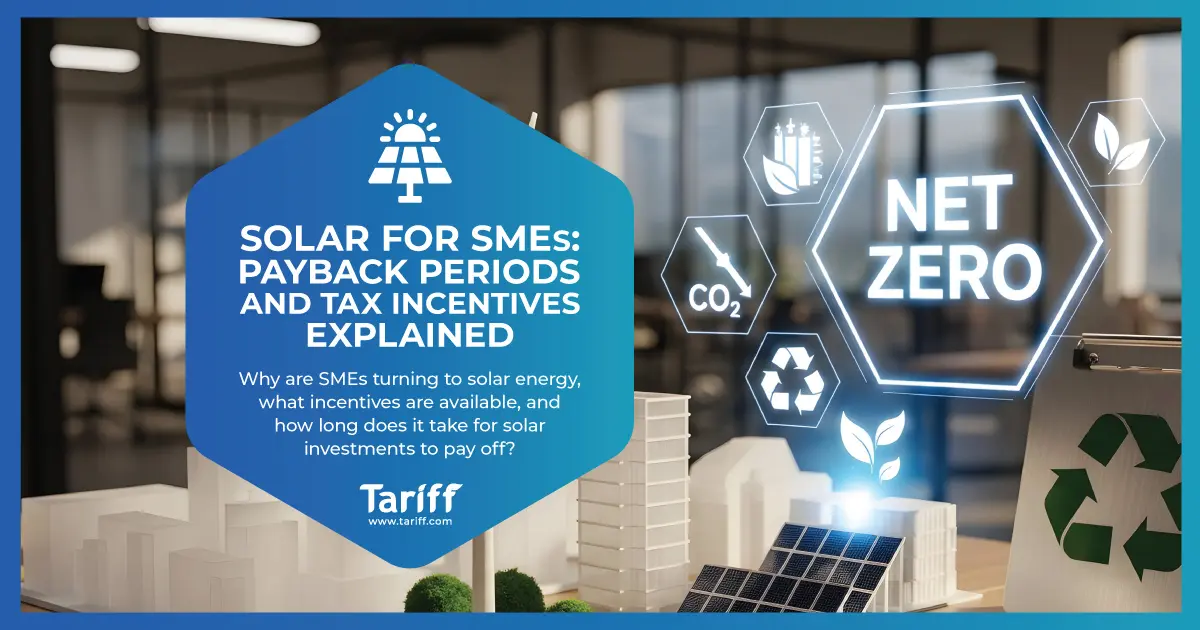What Is The Future For Gas Prices In The UK?
In recent months, it’s inevitable you’ll have been exposed in some capacity to the recent energy crisis. You could’ve seen that reflected in your personal bills, in the prices you’ve paid to heat and power your business premises, or simply as the dominant storyline across the news.
It’s only now that we’re starting to see some stability in home and business gas prices, but there’s still some uncertainty around what the future holds for gas and electricity prices. That’s why Tariff are committed to illuminating a brighter future in energy for all of us.
With this article, we’ll break down what the next few months and years could hold for electricity and gas prices in the UK, as well as what’s lead to the current situation, and what you can do to combat any potential rises.
What Are Gas Prices Currently?
Before looking to the future, it’s important to establish what the prices of home and business gas prices are at the moment. They’ve seen meteoric increases over the last few months, with gas prices having seen an unprecedented rise of over 129% since 2020 according to the Office of National Statistics.
There’s multiple different reasons behind that astronomical climb which we’ll touch on in a later section, but in brief terms, business gas prices are at a higher rate than they’ve ever been. They’re now based on the size of your business, rather than being a flat rate as it is for consumers.
Here’s a brief breakdown of what you can expect to pay for your business gas, depending on the size of your enterprise, and the number of employees you have.
- A microbusiness (less than 10 people) will pay an average of 5 pence per kWh, alongside a daily standing charge of 38.4 pence.
- A small business (less than 50 employees) pay, on average, 5 pence per kWh, as well as the customary daily standing charge of 34.2 pence.
- Medium-size businesses (below 250 employees) can expect to pay 5 pence per kWh on average, with 36.7 pence per day in standing charges.
- Larger businesses (more than 250 people) will pay 5 pence per kWh on average, with a more substantial daily standing charge of £1.69, or 169 pence.
As you might expect, these are only averages, and individual business gas suppliers are able to set their own rates based on a wide range of factors. With so many individual suppliers vying to get your business, there’s likely to be other options out there that better suit the needs and gas demands of your business.
However, one thing these averages do serve to do is highlight the need for effective switching services for your business gas, and prompt further focus on finding the best possible deal.
Why Are Gas Prices So High?
Now that we’ve better established the current state of business gas prices, and how they’ve seen enormous and worrying rises over recent years, it’s important to understand what’s caused that increase in the first place.
Of course, there’s not a singular reason behind those increases, but there are several pivotal factors that have played important roles in prompting that move. We’ll break down a few of these, and why they’re integral to understanding why your business gas prices are as high as they are.
- Conflict In Ukraine – The Russian invasion of Ukraine has had devastating and unimaginable effects for those affected by the conflict, as well as impacting the global energy market. Energy suppliers have understandably moved away from using Russian gas supplies, but in doing so, prices have unavoidably risen due to Russia’s monopoly on natural gas.
- Low Gas Reserves – The UK has one of the lowest levels of gas storage across the whole of Europe, with the Financial Times estimating our storage facilities are at 54% of capacity, compared to the continental average of 80%.
- Unpredicted Weather Patterns – An unexpectedly cold winter across both 2020 and 2021 meant that gas supplies were in much greater demand. Coupled with the UK’s very low stockpiles of energy, supplies of gas were in very limited supply.
- Nord Stream Closures & Delays – Europe’s largest gas pipeline, the Nord Stream 1, stretched from Russia to Germany before its closure in 2017. While substantial plans were in place to construct the Nord Stream 2 as its successor, Russia’s volatility and invasion of Ukraine meant that construction of the huge gas highway was delayed indefinitely.
- Post-Pandemic Recovery – As the world has begun to return to a semblance of normality following the COVID-19 pandemic, the demand for energy has sharply increased, meaning higher prices and lower stockpiles.
- Changing Global Energy Focus – With a firm target set for global net-zero by 2050, huge consumers of coal like China, Japan and Brazil have begun making the switch to natural gas, leading to a much increased global demand for the commodity.
Of course, there are other factors that have ultimately contributed towards the fluctuating energy prices we’ve seen in recent times, but these are the most pivotal reasons behind why you might be seeing higher prices on your business gas bills.
What Impact Does High Gas Prices Have?
Naturally, as an entrepreneur, your primary concern when it comes to rising business gas prices is the amount you’re going to pay to power your business. After all, those overheads factor into everything from your yearly projections to your overarching business plan.
However, the rising cost of gas can also mean wider-reaching impacts for the rest of your business energy demands, and especially so in your business electricity.
The reason behind this is that burning natural gas accounts for a significant percentage of the electricity we use in the UK. The ESO (Electricity System Operator) for the UK published figures recently showing that, up until April 2023, natural gas produced 34.4% of all the electricity used in the country.
That’s often why the rise in gas prices coincides with rising electricity prices – the two are intrinsically linked, and have been since the inception of the National Grid in 1935. As gas prices rise, so too do the prices you’ll pay for electricity.
While that may seem a disheartening statistic, and indeed it can forecast difficult times ahead for industrial-scale businesses and high-energy sectors like manufacturing, there is a note of positivity that underscores those price rises.
As gas prices rise, and supplies of natural gas become more scarce because of the reasons we discussed earlier, there’s more of a financial incentive for energy providers to look into utilising the range of renewable energy option we have open to us in the UK.
In fact, those same statistics from the ESO show that 46% of our electricity now comes from renewable and zero-carbon sources, which highlights the successes we’ve seen with wind and solar power in recent months.
Plus, as we begin to see more sustained success with green and renewable energies, investments into technology will start to gain traction, leading to greater production, more consistency, and a brighter future in energy.
What Will Happen With Gas Prices In The Future?
This isn’t a question with a simple answer, unfortunately. There’s often uncertainty around energy prices at the best of times, and as the world faces a dwindling amount of gas and other natural resources, there’s no way to know for certain what the price of gas will be in the future.
However, as we’ve just seen, there’s an increased and pressing focus on developing renewable initiatives, which natural gas is highly unlikely to be a part of. This means that, as the energy market changes, the prices of gas is likely to increase.
This will only happen gradually, especially as the UK has such a reliance on gas (34.4% of all our electricity comes from there, as we’ve seen), but it’s an inexorable move towards new and emerging energy technologies.
There’s nowhere that’s more apparent than the UK’s use of wind turbines and farms. With off- and onshore wind farms generating an estimated 24.6% of the country’s electricity already, and further governmental and private sector investment coming through thick and fast, the way forward for energy is becoming increasingly clear.
However, while this does cast doubts over the future of business gas prices in the UK, it better outlines the move for businesses in the future, and with services like Tariff that allow you to switch and compare business gas prices, there’s an abundance of resources available to make that transition as smooth and effortless as possible.
How Can My Business Prepare For The Future Of Energy?
While the future of business gas is still uncertain, there’s still a huge amount of steps you can take to ensure you’re best equipped for the further development of the energy market, and for the global shift towards carbon neutrality by 2050.
At Tariff, we’re perfectly positioned to help your business, regardless of the size of your company or the sector you operate in. Here’s just a snapshot of the tailormade services we can provide.
Switch Your Business Gas Provider
While gas power is slowly being phased out over the next few years and decades, many businesses still rely upon it for a range of integral services, especially across heavy industry and manufacturing sectors.
It’s with that in mind that Tariff operates a comprehensive business gas switching service, tailormade to meet the requirements and unique needs of your business. We’ve got extensive experience dealing with an array of different sectors, and will work tirelessly to ensure that we find the best possible option for you.
This involves sourcing the best possible deals, and liaising consistently and effectively throughout the process to ensure that we’re not only sourcing the cheapest or greenest deals, we’re finding something that works for you and your enterprise.
Adopt Renewable Energy
It’s an unavoidable change that all business owners need to face, but the global move to net-zero is a much needed one for the preservation and sustenance of our planet. And as a planet-first provider of energy switching services, we’re fully committed to playing our pivotal role in that shift.
While it’s inevitable some businesses will need to rely upon natural gas for the coming years, it’s also true that we can still make changes that will ultimately better facilitate a larger-scale switch from gas to renewable sources.
With Tariff’s comprehensive understanding of the renewable energies market, and what that means for each individual business we work alongside, we’re able to source not just a bespoke solution for your company, but one that prioritises eco-initiatives and green energy.
Along the way, we’ll work diligently to source energy deals that we know have long-term plant-focused ideals at their core, and that can not only meet the energy needs of your enterprise, but offer plans and packages that suit your finances, too.


